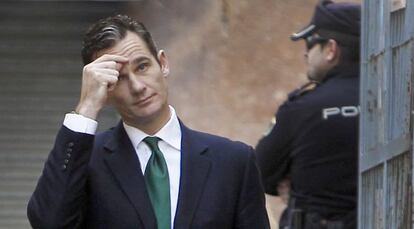Royal couple failed to pay €281,109 in corporate taxes, report reveals
More details of business dealings of king’s son-in-law Iñaki Urdangarin emerge “We don’t know why he was hired,” Altadis board member told investigating judge

The tax agency has produced a new financial profile of Iñaki Urdangarin, the king’s son-in-law who is being investigated for embezzlement of public money and tax fraud.
The latest development in the ongoing investigation, which is threatening to drag Urdangarin’s wife, Princess Cristina de Borbón, into the case shows that between 2007 and 2010 the couple failed to pay 281,109 euros in corporate tax for Aizóon, the company they jointly own.
Aizóon never had any employees or activity, and its sole function appears to have been the channeling of funds secured by another one of Urdangarin’s business ventures, the Noós Foundation. According to the investigation, the foundation obtained six million euros’ worth of no-bid contracts from the regional governments of Valencia and the Balearics for organizing sports events. The governments were billed for much more than the real cost of the events, and the investigating judge, José Castro, believes the deals were obtained because of Urdangarin’s royal connections. Much of the money ended up in tax havens and private companies. Urdangarin’s business associate, Diego Torres, is facing the same charges.
It has also emerged from the investigation that there is no document, testimony or concrete explanation for what it is that Urdangarin did in his role as advisor for several major corporations, which paid him hundreds of thousands of euros a year.
“We don’t know the reason why he was hired, it’s that simple,” said Ignacio Valentín Millán, deputy secretary of the board of tobacco firm Altadis, in a December 2006 statement to the judge. Altadis was paying Urdangarin 30,000 euros a year.
There is ample evidence to suggest that King Juan Carlos’ son-in-law was hired because of his “family circumstances,” said the tax agency report, after analyzing the testimony from the corporate representatives, none of whom were able to produce anything specific that Urdangarin did for them. In 2007 alone the former Olympic handball player received 220,000 euros from Mixta Africa, more than 100,000 euros from Motor Press and Lagardère, and 30,000 euros from Aceros Bergara.
The husband of Princess Cristina earned up to 700,000 euros a year as an adviser for national and international firms, including the royal state company of Morocco.
The Duke of Palma channeled all that money through Aizoon in order to pay the minimum tax on it, the report explains.
Meanwhile, Judge Castro is also exploring Princess Cristina’s possible involvement in the scheme as co-owner of Aizoon, whose credit cards she used to make personal purchases such as children’s clothing and cultural activities. So far, the public prosecutor has found no hard evidence to make King Juan Carlos’ daughter an official suspect in the case. But the media exposure has already damaged the royal family’s reputation at a time when even the king’s own image has deteriorated significantly, following an elephant hunt in Africa.
Earlier this month, the judge seized half of the royal couple’s luxury residence in Barcelona and several other properties to cover the 6.1-million-euro bond that he and his former partner Torres failed to pay to cover their liability.
Tu suscripción se está usando en otro dispositivo
¿Quieres añadir otro usuario a tu suscripción?
Si continúas leyendo en este dispositivo, no se podrá leer en el otro.
FlechaTu suscripción se está usando en otro dispositivo y solo puedes acceder a EL PAÍS desde un dispositivo a la vez.
Si quieres compartir tu cuenta, cambia tu suscripción a la modalidad Premium, así podrás añadir otro usuario. Cada uno accederá con su propia cuenta de email, lo que os permitirá personalizar vuestra experiencia en EL PAÍS.
¿Tienes una suscripción de empresa? Accede aquí para contratar más cuentas.
En el caso de no saber quién está usando tu cuenta, te recomendamos cambiar tu contraseña aquí.
Si decides continuar compartiendo tu cuenta, este mensaje se mostrará en tu dispositivo y en el de la otra persona que está usando tu cuenta de forma indefinida, afectando a tu experiencia de lectura. Puedes consultar aquí los términos y condiciones de la suscripción digital.








































